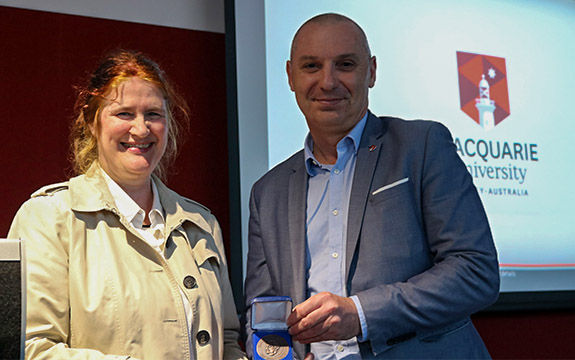Swinburne physicist Professor Margaret Reid wins Moyal Medal

In Summary
- Swinburne's Professor Margaret Reid is the first woman physicist to be awarded the Moyal Medal
- The science medal is named after the late Australian mathematician and mathematical physicist Professor José Enrique Moyal
- Professor Reid is currently a Professor of Physics at Swinburne and a fellow of the Australian Academy of Science
Swinburne researcher Professor Margaret Reid has become the first woman physicist to be awarded the Moyal Medal, recognising her outstanding contributions to the field of physics.
The prestigious science award is given annually and named after the late Australian mathematician and mathematical physicist Professor José Enrique Moyal.
His insight into the interaction between mathematics, physics and statistics has had far-reaching ramifications for a number of fields, including aeronautical engineering, electrical engineering and statistics.
“It is such an honour to be awarded,” says Professor Reid. “It was the nicest professional email and invitation I have ever received! I was totally surprised.”
It was especially wonderful given the nature of Moyal’s work and how it relates to her own, she says.
“He was responsible for many of the results on phase space methods that I use routinely in my theoretical work in quantum physics. In preparing the talk I gave when receiving the award, it was good to be able to reflect on his work and its impact.”
Professor Reid’s history
Professor Reid is currently a Professor of Physics at Swinburne and a fellow of the Australian Academy of Science.
She completed her PhD and postdoctoral studies at the University of Auckland and University of Waikato in New Zealand, working on theories for squeezed states of light. She has also conducted research at AT&T Bell Laboratories in the United States (USA), where she developed the atomic theory for the first experiment creating squeezed light.
Subsequently, she proposed how to create Einstein-Podolsky-Rosen entanglement using parametric down conversion, connecting squeezing and entanglement, which has helped with quantum noise reduction.
For contributions to the fields of quantum entanglement and nonlocality, she was made a fellow of the Optical Society of America and a fellow of the American Physical Society. She was recently awarded a visiting position at Harvard University and a JILA Fellowship at the University of Colorado in the USA.
Receiving the award
In a ceremony at Sydney’s Macquarie University, Professor Reid was presented with the Moyal Medal and delivered a lecture titled “Einstein’s elements of reality, entanglement and understanding the quantum to classical transition”.
In the lecture, she discussed how Albert Einstein, along with Boris Podolsky and Nathan Rosen, had reservations about the interpretation of quantum mechanics. These reservations led to debate over the meaning of quantum mechanics, and gave the underpinning for the new field of quantum information.
Bringing these thoughts into the modern day, Professor Reid outlined discoveries in this field and the different interpretations of quantum mechanics over time.
To find out more about the award criteria and past winners, see: Moyal Medal.

